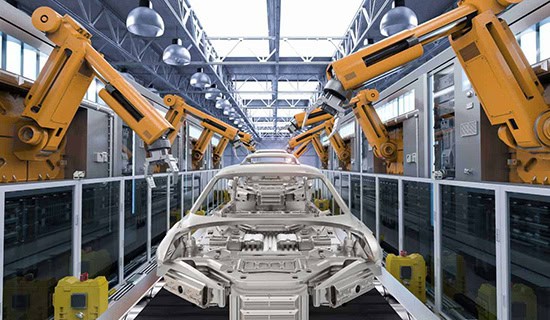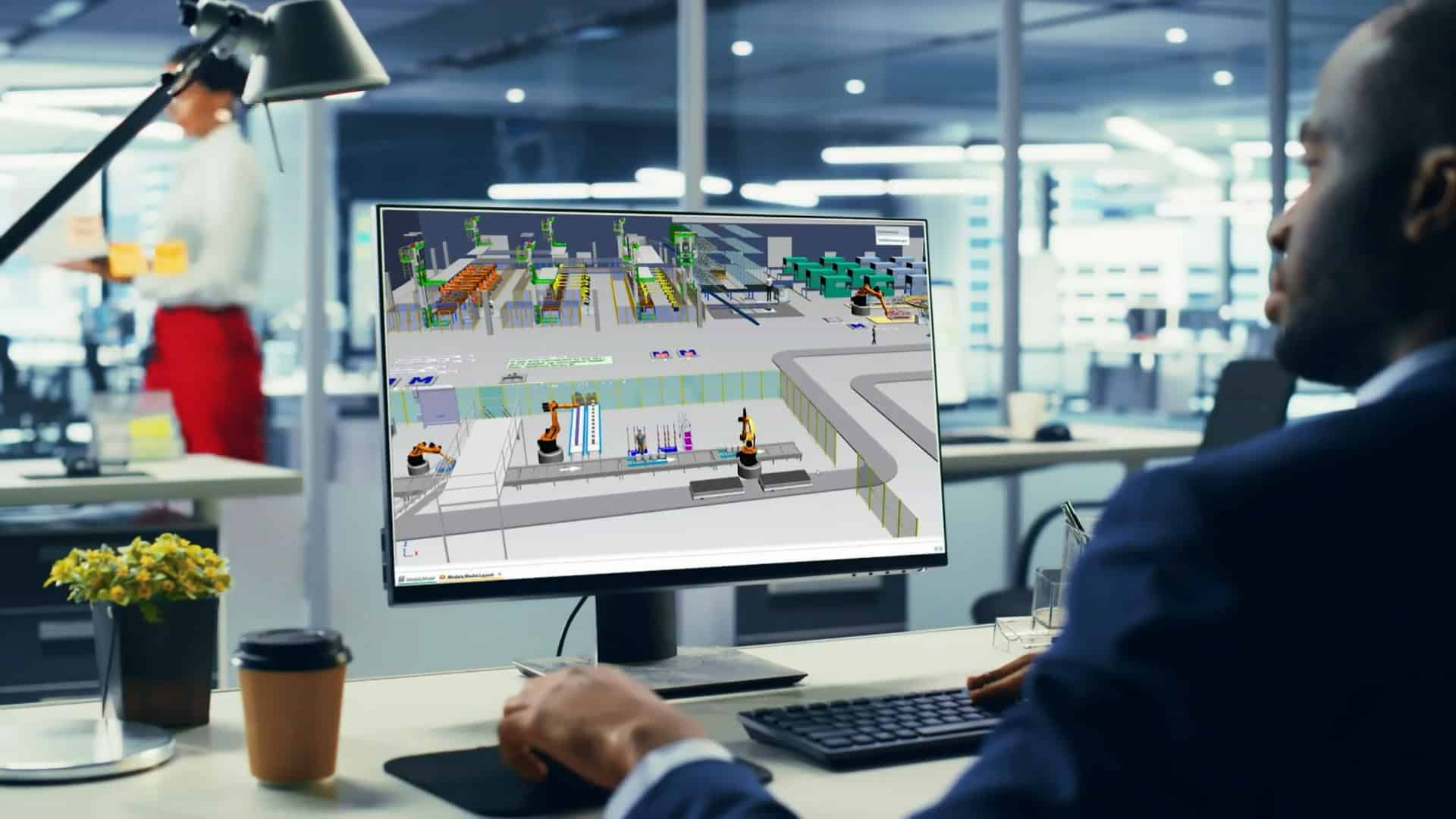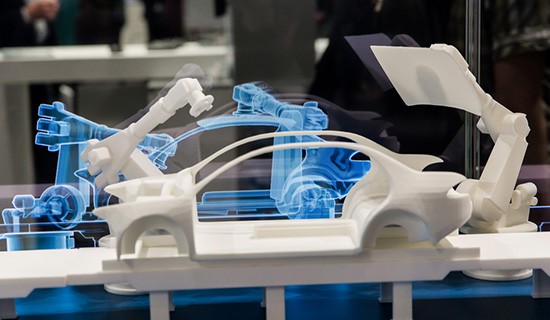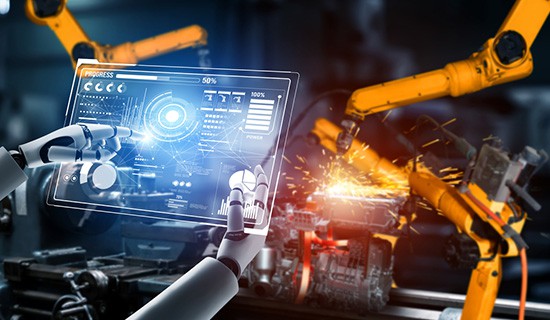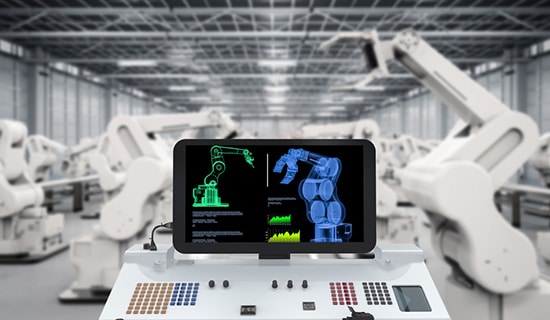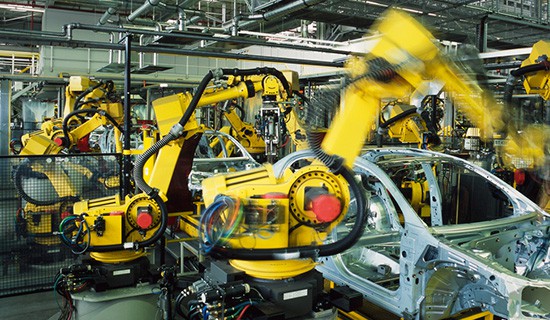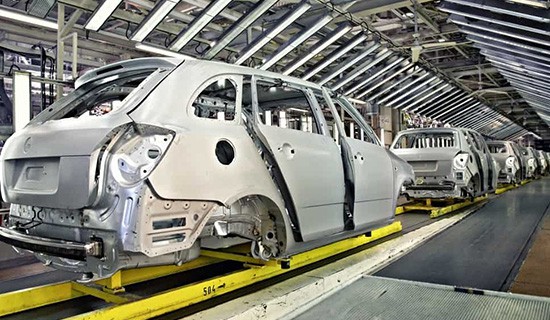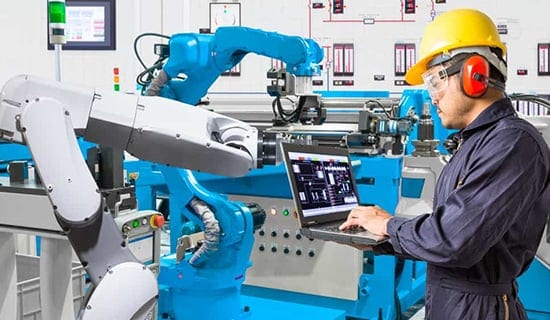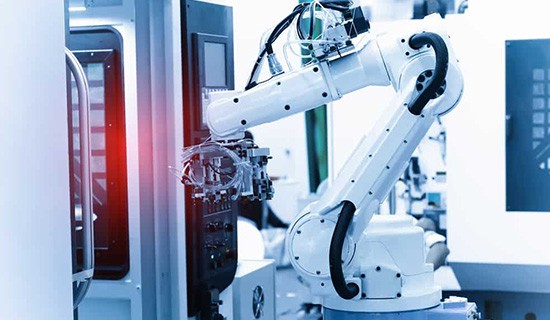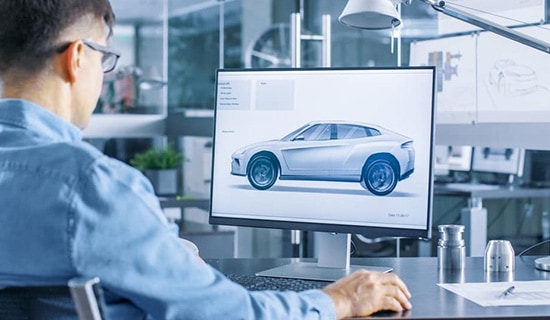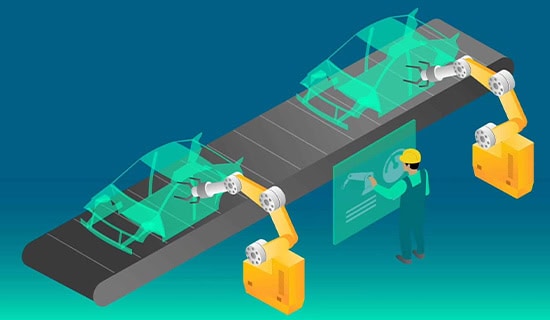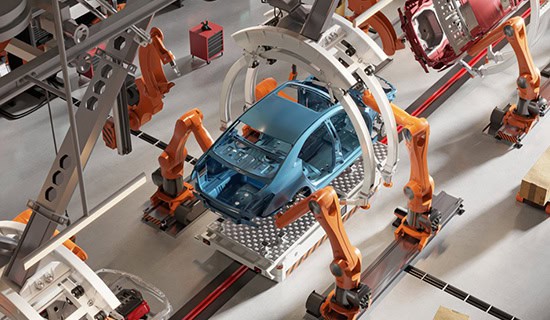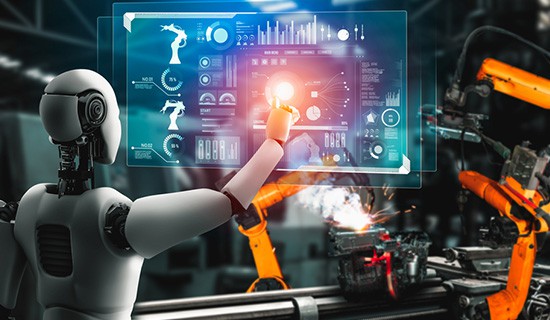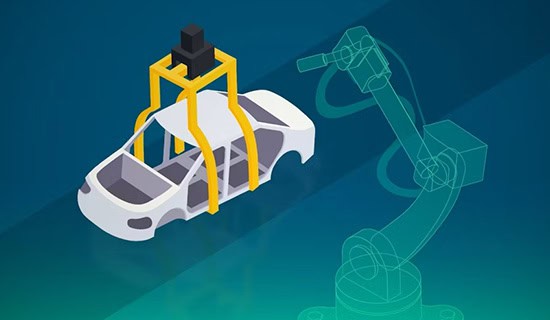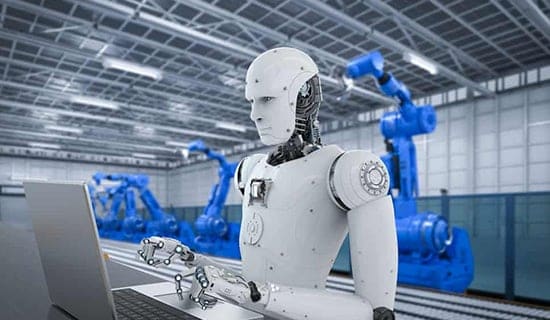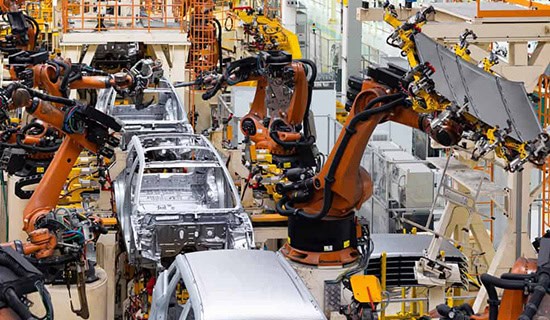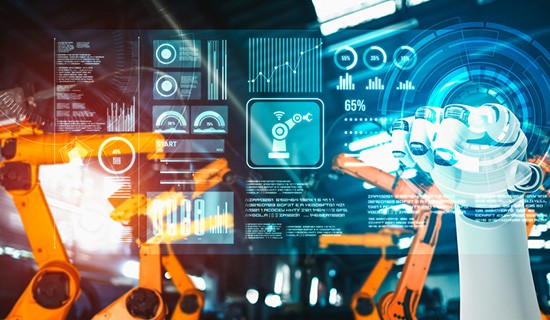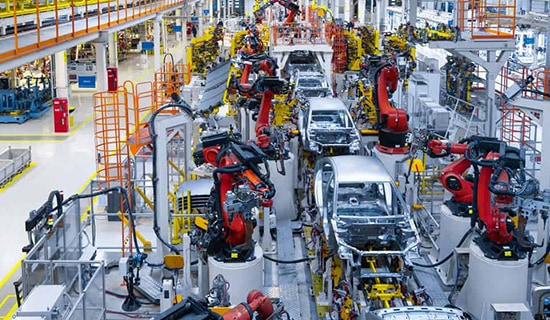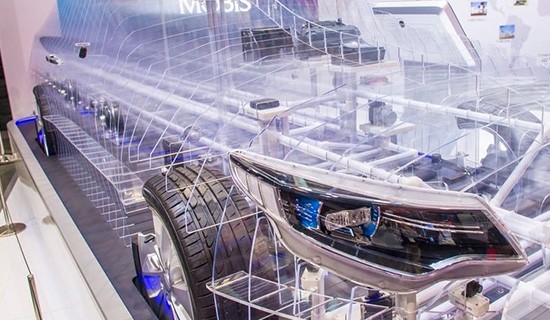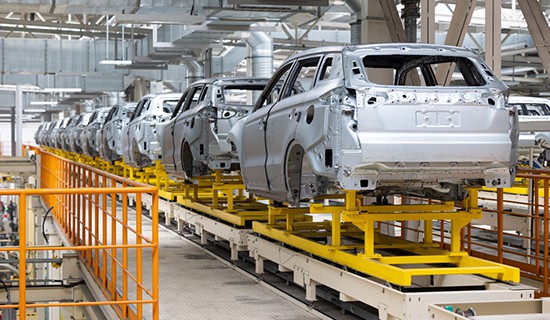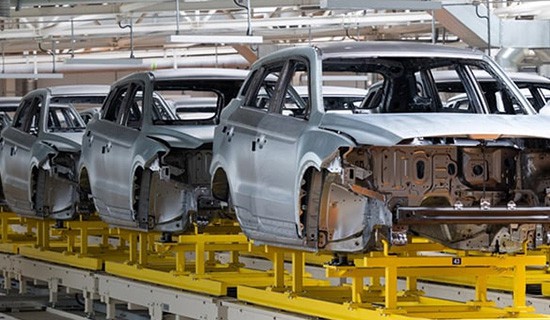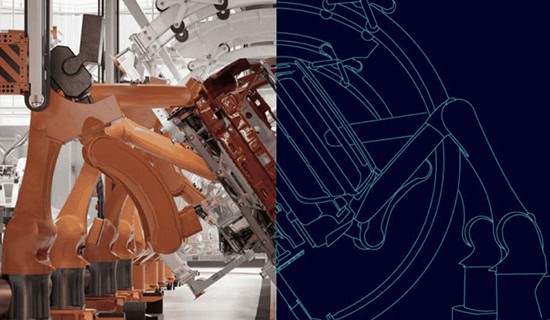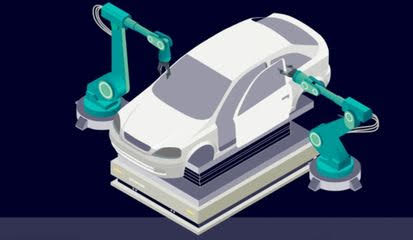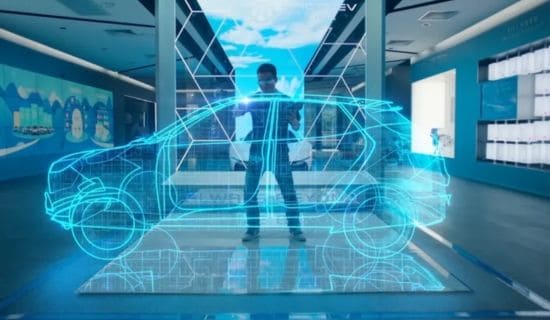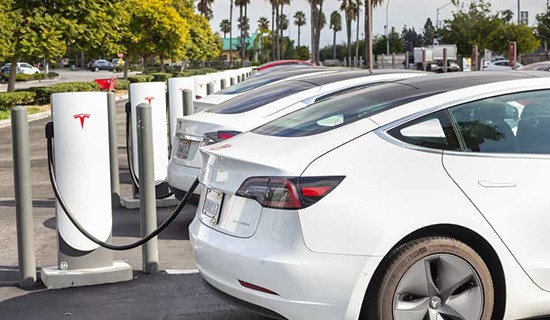Smart Manufacturing for Automotive
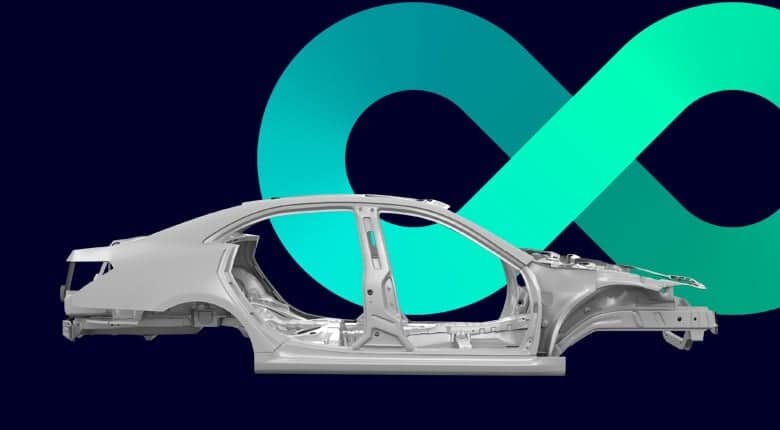
-
Unlocking the Potential of Intelligent Production in Auto Manufacturing
At the core of intelligent production environments is the ability to monitor and adjust manufacturing processes in real time.
Read more -
Staying Competitive with Rapid Auto Plant Transformation
To keep pace with evolving customer demands and market changes, auto manufacturers must adopt smart manufacturing solutions that allow them to rapidly transform their production facilities.
Read more -
Virtual manufacturing engineering for the automotive industry
How can you guarantee the launch of a plant with safe, efficient, and sustainable production through upfront validation of the design and manufacturing processes?
Read more
Trending Now
Smart manufacturing for automotive and transportation
Drive operational excellence with intelligent technologies and advanced automation Navigate rapid change and achieve operational excellence by embracing smart manufacturing for next-level automation, and production excellence.
The value of smart manufacturing in automotive
A powerful trifecta of advanced automation, intelligent solutions, and immersive technologies is defining the future of sustainable smarter manufacturing.
Use Cases
Navigating Smart Manufacturing in 2025: Key Challenges for the Auto Industry
A look at the top 2025 smart auto manufacturing issues related to automation, digital transformation, robotics, embedded AI, and more.
Smart Manufacturing in the Automotive Industry
Learn how auto manufacturers are addressing various challenges they face with smart manufacturing in this state of the market report.
Riding Out Automotive Market Uncertainty with Digital Twins
A critical aspect of using digital twins is that they can complement traditional forecasting and prescriptive tools by incorporating real-time monitoring and simulations.
Using Fuzzy Logic and AI to Improve Supply Chain Efficiency
The integration of fuzzy logic and AI presents significant opportunities for organizations like smart automotive manufacturers to enhance their supply chain management practices.
Digital Twins, IT/OT Convergence Drive the Industrial Internet
Digital twins offer a way to apply advanced analytics to derive insights that, in turn, drive optimization of production and operation processes.
Smart Manufacturing: Melding Digital and Physical Worlds
Smart manufacturing helps automakers achieve greater efficiency and accelerate innovation by blending digital technologies with the physical realm, making it possible to accomplish things we’ve never seen before.
You Can’t Spell Smart Manufacturing Without AI
AI helps smart manufacturers use the vast amounts of data being generated from IoT devices and smart sensors throughout their factory.
Not Your Father’s Auto Industry: Why Smart Manufacturing is Needed as We Head into 2024
Smart manufacturing technologies like digital twins, virtual commissioning, and more can bring about the required changes to move the industry forward in the years to come.
How Smart Technologies are Helping Simplify Sustainability in Auto Manufacturing
Smart technologies are emerging as a powerful simplifying force amid the complexities of pursuing sustainability goals.
How Smart Manufacturing Makes Smart Autos Possible
Automakers are using virtual commissioning, digital twins, advanced supply chain management, and more to meet ever-changing customer demands for smart autos.
Building a More Sustainable Factory Floor Leveraging Smart Manufacturing
Auto manufacturers are adopting smart manufacturing strategies to modernize facilities and improve the sustainability of their operations.
Enabling Greatly Needed Flexibility with Smart Manufacturing
While most associate smart manufacturing with improvements in operational efficiencies and faster time to market, the same principles and solutions deliver the flexibility to adapt to market changes.
What’s Next for Smart Factories? A Look Ahead to Industry 5.0
Industry 5.0 builds on the technologies of Industry 4.0 but emphasizes sustainability and the collaboration between humans and machines.
Addressing a Fact of Life: Compressed Development and Launch Times in Auto Manufacturing
Automakers can successfully address compressed development and launch timelines by embracing Agile methodologies, advanced digital tools, and flexible supply chain strategies.
Human-robot Collaboration and Smart Manufacturing
Virtual commissioning and digital twins can help automakers and their Tier 1 parts suppliers ensure that their human-robot collaboration projects achieve their desire objectives without posing a safety threat to the human operators.
2024 Automotive Smart Manufacturing Trends
There is no question that auto manufacturers will rely on smart manufacturing strategies and solutions in the coming year. Here are some trends to look for in 2024.
The Value of Smart Manufacturing in Automotive
In a world racing towards the future, automotive leaders are not just keeping pace but setting the speed..
Smart Manufacturing for Automotive and Transportation
Drive operational excellence with intelligent technologies and advanced automation Navigate rapid change and achieve operational excellence by embracing smart manufacturing for next-level automation, and production excellence.
Digital Twins and Other Tech Enable Virtual Commissioning
Virtual commissioning saves time and money, and it avoids interruptions of existing work cells, production lines, and plants.
Researchers Amplify Impact of Generative AI in Auto Design
A new technique allows designers to add engineering constraints into the text-to-image generative AI process, cutting down the iterations needed to address design considerations.
A Deep Dive into Virtual Commissioning
Virtual commissioning uses digital twins, sophisticated simulations, and modeling to help manufacturers adjust to changes and modernize their operations.
The Value of Virtual Manufacturing Engineering
Guarantee a flawless launch with virtual manufacturing. Simulate your entire production line virtually, identifying issues before physical commissioning. This virtual environment let’s all your engineers collaborate seamlessly, driving sustainability in the manufacturing process.
Virtual Manufacturing Engineering for the Automotive Industry
How can you guarantee the launch of a plant with safe, efficient, and sustainable production through upfront validation of the design and manufacturing processes?
Staying Competitive with Rapid Auto Plant Transformation
To keep pace with evolving customer demands and market changes, auto manufacturers must adopt smart manufacturing solutions that allow them to rapidly transform their production facilities.
The Increasing Role of Cobots in Automotive Smart Manufacturing
While there are challenges to overcome, cobots offer a number of benefits when they are part of a comprehensive smart manufacturing automation strategy.
Smart Factory Modernization Improves Efficiency
The automotive industry’s embrace of smart factory modernization will revolutionize production processes (and, in many cases, already has), enabling real-time monitoring, predictive maintenance, and optimized workflows.
Accelerating Innovation: How Virtual Development Mitigates Rapid Change in Auto Manufacturing
Virtual development is a tool for innovation and efficiency and will continue to be a cornerstone in the evolution of auto manufacturing, shaping the vehicles of tomorrow and the processes that create them.
The Value of Rapid Factory Transformation
By updating legacy equipment, you can gain actionable insights into production and accelerate the modernization of your plant. Transform your production facilities to monitor and predict operational performance in real time, reducing downtime and increasing efficiency.
Enabling the Acceleration of Factory Conversion to Smart Factories
RTInsights talks with Siemens about the need to convert to smart factories, the technologies that can help, and the benefits that automakers can derive from making the change.
Unlocking the Potential of Intelligent Production in Auto Manufacturing
At the core of intelligent production environments is the ability to monitor and adjust manufacturing processes in real time.
Why Automakers Need Intelligent Manufacturing Operations
Intelligent manufacturing solutions let companies react faster to issues on a production line or plant and to changing market conditions.
How AI-Driven Feedback Loops Make Car Manufacturing More Competitive
Integrating artificial intelligence (AI) into feedback-driven processes pushes the boundaries of what’s possible in automotive manufacturing.
Virtualizing the Automated Assembly Line
Automotive assembly line virtualization involves the use of digital tools and techniques to model, simulate, optimize, and manage assembly processes before they’re physically implemented.
Manufacturers Embrace Digital Twins for Enhanced Production
Manufacturers are looking into digital twins as a way to reduce the costs of commissions and improve client relations.
Why Auto Makers Must Move to Intelligent Manufacturing Operations
A discussion about the factors driving the need for smart manufacturing, key technologies that help auto manufacturers make that change, and the benefits they will realize in using the technologies and solutions.
Drive Quality and Sustainability Through Intelligent Production
While automotive manufacturers adopt IoT, AI, and machine learning, unlocking their full potential requires extracting actionable data insights for optimized production, reduced waste, and sustainability.
The Value of Intelligent Production Excellence
Harness the power of data, monitor performance, and address operational issues in real-time. Transform your production facilities into intelligent plants with smart manufacturing solutions.
Transform Your Plant with the Next Level of Smart Manufacturing
Explore case studies from two automotive powerhouses; Porsche and Volkswagen and learn how they were able to set new standards in automotive production.
Production Operation and Optimization for Automotive
The rising complexity in automotive production requires flexibility, scalability, faster time-to-market and sustainability in the shopfloor operations. It needs next-level automation.
Electric Car Factory for China’s Sales Champion
The sales champion of China’s electric vehicle market, BAIC BJEV, has built the group’s first mass production base for energy vehicles. To strengthen the brand, improve product quality, and produce vehicles that can even better meet the market’s needs, the company turned to Siemens hardware and software and its SICAR standard for the automotive industry.
Resources
Transform Your Plant with the Next Level of Smart Manufacturing
Explore case studies from two automotive powerhouses; Porsche and Volkswagen and learn how they were able to set new standards in automotive production.
The Value of Rapid Factory Transformation
By updating legacy equipment, you can gain actionable insights into production and accelerate the modernization of your plant. Transform your production facilities to monitor and predict operational performance in real time, reducing downtime and increasing efficiency.
Smart Manufacturing in the Automotive Industry
Learn how auto manufacturers are addressing various challenges they face with smart manufacturing in this state of the market report.
The Value of Intelligent Production Excellence
Harness the power of data, monitor performance, and address operational issues in real-time. Transform your production facilities into intelligent plants with smart manufacturing solutions.
Enabling the Acceleration of Factory Conversion to Smart Factories
RTInsights talks with Siemens about the need to convert to smart factories, the technologies that can help, and the benefits that automakers can derive from making the change.
Human-robot Collaboration and Smart Manufacturing
Virtual commissioning and digital twins can help automakers and their Tier 1 parts suppliers ensure that their human-robot collaboration projects achieve their desire objectives without posing a safety threat to the human operators.
Addressing a Fact of Life: Compressed Development and Launch Times in Auto Manufacturing
Automakers can successfully address compressed development and launch timelines by embracing Agile methodologies, advanced digital tools, and flexible supply chain strategies.
2024 Automotive Smart Manufacturing Trends
There is no question that auto manufacturers will rely on smart manufacturing strategies and solutions in the coming year. Here are some trends to look for in 2024.
A Deep Dive into Virtual Commissioning
Virtual commissioning uses digital twins, sophisticated simulations, and modeling to help manufacturers adjust to changes and modernize their operations.
Why Auto Makers Must Move to Intelligent Manufacturing Operations
A discussion about the factors driving the need for smart manufacturing, key technologies that help auto manufacturers make that change, and the benefits they will realize in using the technologies and solutions.
Accelerating Innovation: How Virtual Development Mitigates Rapid Change in Auto Manufacturing
Virtual development is a tool for innovation and efficiency and will continue to be a cornerstone in the evolution of auto manufacturing, shaping the vehicles of tomorrow and the processes that create them.
What’s Next for Smart Factories? A Look Ahead to Industry 5.0
Industry 5.0 builds on the technologies of Industry 4.0 but emphasizes sustainability and the collaboration between humans and machines.
Enabling Greatly Needed Flexibility with Smart Manufacturing
While most associate smart manufacturing with improvements in operational efficiencies and faster time to market, the same principles and solutions deliver the flexibility to adapt to market changes.
Building a More Sustainable Factory Floor Leveraging Smart Manufacturing
Auto manufacturers are adopting smart manufacturing strategies to modernize facilities and improve the sustainability of their operations.
Not Your Father’s Auto Industry: Why Smart Manufacturing is Needed as We Head into 2024
Smart manufacturing technologies like digital twins, virtual commissioning, and more can bring about the required changes to move the industry forward in the years to come.
How Smart Technologies are Helping Simplify Sustainability in Auto Manufacturing
Smart technologies are emerging as a powerful simplifying force amid the complexities of pursuing sustainability goals.
How Smart Manufacturing Makes Smart Autos Possible
Automakers are using virtual commissioning, digital twins, advanced supply chain management, and more to meet ever-changing customer demands for smart autos.
Smart Manufacturing Essential for the Transition to EVs
Many of the broad range of technologies (e.g., digital twins, virtualization, and more) that help auto manufacturers enable intelligent or smart manufacturing operations can play a role in the transition to EVs.
How AI-Driven Feedback Loops Make Car Manufacturing More Competitive
Integrating artificial intelligence (AI) into feedback-driven processes pushes the boundaries of what’s possible in automotive manufacturing.
Virtualizing the Automated Assembly Line
Automotive assembly line virtualization involves the use of digital tools and techniques to model, simulate, optimize, and manage assembly processes before they’re physically implemented.
Manufacturers Embrace Digital Twins for Enhanced Production
Manufacturers are looking into digital twins as a way to reduce the costs of commissions and improve client relations.
You Can’t Spell Smart Manufacturing Without AI
AI helps smart manufacturers use the vast amounts of data being generated from IoT devices and smart sensors throughout their factory.
Smart Factory Modernization Improves Efficiency
The automotive industry’s embrace of smart factory modernization will revolutionize production processes (and, in many cases, already has), enabling real-time monitoring, predictive maintenance, and optimized workflows.
IoT Connections To Grow by 400% In Four Years
IoT connections are expected to reach 142 million by 2027, primarily due to the growth in 5G standalone deployments.
Researchers Amplify Impact of Generative AI in Auto Design
A new technique allows designers to add engineering constraints into the text-to-image generative AI process, cutting down the iterations needed to address design considerations.
Smart Manufacturing: Melding Digital and Physical Worlds
Smart manufacturing helps automakers achieve greater efficiency and accelerate innovation by blending digital technologies with the physical realm, making it possible to accomplish things we’ve never seen before.
Digital Twins and Other Tech Enable Virtual Commissioning
Virtual commissioning saves time and money, and it avoids interruptions of existing work cells, production lines, and plants.
Why Automakers Need Intelligent Manufacturing Operations
Intelligent manufacturing solutions let companies react faster to issues on a production line or plant and to changing market conditions.
Riding Out Automotive Market Uncertainty with Digital Twins
A critical aspect of using digital twins is that they can complement traditional forecasting and prescriptive tools by incorporating real-time monitoring and simulations.
Digital Twins, IT/OT Convergence Drive the Industrial Internet
Digital twins offer a way to apply advanced analytics to derive insights that, in turn, drive optimization of production and operation processes.
Using Fuzzy Logic and AI to Improve Supply Chain Efficiency
The integration of fuzzy logic and AI presents significant opportunities for organizations like smart automotive manufacturers to enhance their supply chain management practices.
Drive Quality and Sustainability Through Intelligent Production
While automotive manufacturers adopt IoT, AI, and machine learning, unlocking their full potential requires extracting actionable data insights for optimized production, reduced waste, and sustainability.
The Value of Virtual Manufacturing Engineering
Guarantee a flawless launch with virtual manufacturing. Simulate your entire production line virtually, identifying issues before physical commissioning. This virtual environment let’s all your engineers collaborate seamlessly, driving sustainability in the manufacturing process.


